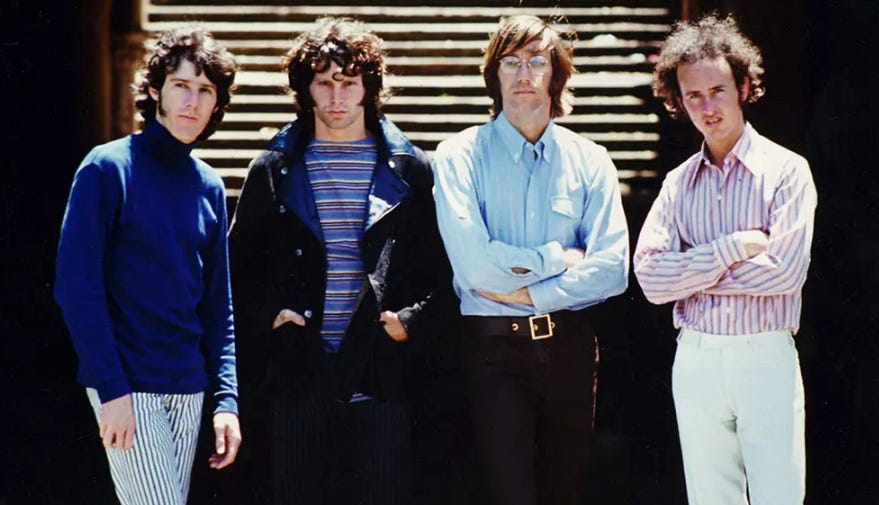The band's unique sound, which blended rock, blues, and psychedelia, along with their enigmatic frontman Jim Morrison, made them one of the most influential and controversial bands of the 1960s. Here is a detailed history of The Doors:
Formation (1965):
The Doors were formed in 1965 when Jim Morrison, a film student at UCLA, met Ray Manzarek, a fellow student with a background in music. They shared a mutual interest in poetry and music, and Morrison had already been writing some of the lyrics that would later become famous in The Doors' songs. They decided to start a band, with Morrison as the vocalist and Manzarek on keyboards.
Completing the Lineup:
To round out the band, they brought in guitarist Robby Krieger and drummer John Densmore. With this lineup, The Doors were born, and their name was inspired by Aldous Huxley's book, "The Doors of Perception." The name also had a symbolic and metaphysical significance, reflecting the band's exploration of altered states of consciousness.
Early Gigs and Recording Contract (1966):
In 1966, The Doors began performing at various clubs along the Sunset Strip in Los Angeles, gaining a reputation for their captivating live performances. Their break came when they were discovered by Jac Holzman, the founder of Elektra Records, who signed them to a record deal.
Debut Album (1967):
The Doors released their self-titled debut album in January 1967. The album included their first big hit, "Light My Fire," which reached #1 on the Billboard Hot 100 chart. The band's use of organs and keyboards, along with Morrison's poetic and sometimes provocative lyrics, set them apart from other rock acts of the time.
Controversy and Success (1967-1968):
The Doors' early success was marked by controversy. Their performance on "The Ed Sullivan Show" in 1967 was heavily censored due to the suggestive nature of Morrison's lyrics, particularly in "Light My Fire." This incident only added to the band's mystique.
The Doors' second album, "Strange Days," was released in 1967 and also achieved critical acclaim. It included hits like "People Are Strange" and "Love Me Two Times." The band's live performances often featured Morrison's unpredictable behavior, which only added to their notoriety.
The Soft Parade and Morrison Hotel (1969):
The Doors released several more albums in quick succession, including "Waiting for the Sun" (1968), "The Soft Parade" (1969), and "Morrison Hotel" (1970). These albums featured a more bluesy and stripped-down sound, moving away from the experimental psychedelia of their earlier work.
Lawsuits and Legal Troubles (1969):
In 1969, Jim Morrison was arrested for alleged indecent exposure during a concert in Miami, Florida. This incident led to legal troubles for the band and put a strain on their relationship with their record label.
The Doors' Legacy:
Jim Morrison's death in Paris on July 3, 1971, marked the end of The Doors as a band. He was just 27 years old at the time, joining the infamous "27 Club" of rock stars who died at that age. The remaining members briefly attempted to continue as a trio but eventually disbanded.
The Doors left a significant mark on the history of rock music. Their songs, such as "Light My Fire," "Riders on the Storm," and "Break on Through (To the Other Side)," continue to be iconic and beloved by generations of music fans. Jim Morrison's charisma and poetic lyrics, combined with the band's distinctive sound, have cemented their place as one of the greatest rock bands of all time.
The surviving members of The Doors, Ray Manzarek, Robby Krieger, and John Densmore, continued to perform and collaborate with other artists in various capacities over the years. They honored Jim Morrison's memory and celebrated their own contributions to rock history.
The Doors' music and legacy have endured, and their influence can still be heard in the music of countless contemporary artists. They remain a symbol of the counterculture and artistic exploration of the 1960s, and their impact on rock music continues to be celebrated.

